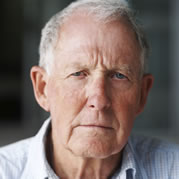I think we can all agree that living with a stroke is not without its challenges. However you have realised what makes being active difficult for you and worked out ways to overcome them.
The skills that you have learned through doing this section can be applied to any type of activity. Remember to come back and revisit any part of this section as you progress.
Kelly and Jean in the Cafe – jumping in too soon
Friends and family want to help as much as they can. This is only natural. However jumping in too soon can be frustrating, especially if you want to give things a try yourself.
View text alternative
Jean: There you go (places tray of drinks on the table)
Kelly: You know, it’s just so lovely getting out, it’s such a lovely day, I’ve just been looking forward to this for so long, I feel like I’ve been stuck in the house
Jean: I know you asked for coffee, but I’ve brought you tea, I thought that might be better for you
Kelly: Oh right, ok..
Jean moves all the cups of the tray, but doesn’t let Kelly help
Jean: I’ve brought some cakes though
Kelly: right, uh-huh, they look lovely
Jean moves Kelly’s cup away from her, then starts adding sweetner to Kelly’s tea.
Kelly: Oh no, I take sugar in my tea
Jean: Oh no, sweetner’s better for you, much better for you ….. (stirs cup)….there you go (hands over tea)
Jean: Would you like a cake, here let me ..
Kelly: Look, Jean, I can do things for myself, if I don’t start doing things for myself I’ll never learn.
Jean: I’m only trying to help
Kelly: Och, I know you are
Jean: There you go…. (hands over cake)
As you can see this did not work out well. Kelly was frustrated at Jean taking over.
Something to think about
- Has this happened to you?
- What were you trying to do at the time?
- Who was with you?
- How did you feel?
- What could have made it better?
Now let’s go on to see what would happen if the situation was different…
Summary
Learning from other people who have had similar experiences can be very useful but everyone is different, so what works for one person might not work for someone else. However, these are some tips from John’s friends that you might find useful;

Decide what your goal is.
You may have days or weeks when you feel you’re not making progress or that you’re having a set back. This is normal. Try not to lose heart – keep going!

Think about when you want to achieve your goal by and write it down.
It’s good to be ambitious, but don’t make it too hard for yourself.

Try to make a change that you can make last – not just for the present.
Think about people or organisations that can support you to reach your goal – family, friends, health or care workers, volunteer helpers.

You might decide that the goal is no longer useful, practical or important. That’s fine. If something else has taken its place, can you set a different goal for it?
Think about reaching your goal. How will you reward yourself?
Key point
Remember, if you’ve reached your goal you can use the goal setting plan for any further goals you wish to set yourself.
Difficult topics
Advocacy is where you choose another person to support you in or act on your behalf to:
- Enable something to happen e.g. review your benefits entitlement:
- Clarify a situation e.g. deal with a formal agency ie Housing Department or employer.
- Represent your views e.g make sure your opinions are heard.
An advocate can be:
- A family member
- A trusted friend
- A professional advocacy service
Professional advocacy services can be found at; Scottish Independent Advocacy Alliance

I was finding it very difficult to keep on top of all the mail and my bills and things. I found it difficult to phone all the places to sort things out. My good friend came with me to the Citizens Advice team and helped me tell them what I needed help with to sort it all out.

Having had the stroke made me realise I needed to get all my affairs in order. I didn’t want to upset the family more so I got in touch with a professional advocacy service who helped me to make my will with the lawyer and it really helped.
Guidance for Day 1. Writing Session
Select the sound clip below to find out how to start your story.
View text alternative
It was a Friday morning…I was eating breakfast….suddenly the telephone rang…My brother announced to me that….This led me to drop my plate on the floor…etc.
Try to write for about 15-20 minutes. Then put your writing safely to one side for the day. The day after today, or in about a weeks time, move on to the guidance for the second days writing. Well done, you have completed the first step in writing your own emotionally expressive story. You might still be thinking of some of the facts and features of your event. That is perfectly natural. If you want to go further then move on to the next step and try following the instructions for the second day Video Instruction
Key point
Just a reminder that in today’s writing session you are being guided to describe only the facts surrounding your chosen event.
Summary / conclusion
There are lots of things for you to think about and try. I personally found it easier to tackle one thing at a time and I soon realised that small changes made real positive effects to my health.
If you explore the rest of this section it will provide you with more hints and tips to keep healthy.
Summary
When dealing with stress in your life, small changes make big differences.
What makes you feel stressed? Write these down you may see a pattern.
Talking about it really helps, whether it be to a friend or relative or even your GP. A problem shared is a problem halved!
Conclusion
Sometimes when we are thinking of starting something new, like being more active, there can be a lot to consider. Remember even small amounts of activity will improve your health.
Hopefully, you can now see the benefits of being more active. This will help you take the next step towards reaching your goals.
Guidance for Day 2. Writing Session
And now for the second day of writing. Select the sound clip to help you continue your story.
View text alternative
- Firstly, try to write about your deepest thoughts and feelings about the event you described on day 1. To help you do this, put yourself back in the situation again and see if you can remember how you felt. Don’t hold back, try to find words that best describe your deepest thoughts and feelings.
- Secondly, try to describe the impact of this event on your day-to-day living, work and social life in the immediate days and since. So, for example, did it or has it caused you to change aspects and priorities of your life that were important to you.
Well done, you have completed the second days writing. You may have been writing about emotions and thoughts that were bringing you close to the event again and you may feel a little down/sad as a result. This is a perfectly natural and adaptive response to have. Take a step back and reflect but do continue with daily plans and perhaps put in place some of the tips found in the “looking after yourself when writing” section. Then when you are ready move on to the next step and try following the instructions for the third and final writing day
Key point
The main thing to remember on the second day of writing is to let go and really find the right words to describe your emotions and the impact of the event on your day to day living.
Remember feeling a bit sad is quite natural, but you might want to take a look at the Frequently asked questions page at this point.
The road ahead
Now you will have worked out what you can do and how others can help you. Lets hear about how others have got on.
View text alternative

Everyone said my speech was fine after my stroke but I was not convinced. I thought I was slow, boring and I just hated the way it sounded. It is very easy to just avoid speaking, after all I am retired and didn’t have to stand up in front of an audience. Until, the family decided to throw a big birthday party. Something clicked and I decided I would give a speech and vote of thanks to the organisers. It did involve a lot of rehearsal and time hiding away in the spare room. What it made me realise was that I notice the changes in my speech more than anyone else. It seemed to go down well and after all everyone is on your side. I was glad I fought the fear.
View text alternative

I used to be very sociable. I loved a good gossip and meeting up for coffee with friends. But after the stroke, everything just felt irrelevant and I had no patience for meaningless chatter. I think some people felt awkward around me and it all felt wrong. Thinking back I probably was very tired and found the concentration difficult. Luckily I did have a heart to heart with one of my close friends in the group and she helped me work through. The most important thing was not to give up and give yourself time to take back control
View text alternative

I have heard people comment.. “But she looks so well”. I think that is the problem, no one can guess you have difficulty speaking until you open your mouth. And then the reaction!
I used to get very angry that people were ignorant about strokes and the way they can affect you. Now I have found a way to calmly explain that I have had a stroke and sometimes my speech gets muddled. It seems to break the ice.
Key points
Sometimes we can be too self critical and that can stop us trying.
It does take time to adjust, but don’t be too hard on yourself.
Don’t let other people put you off.



